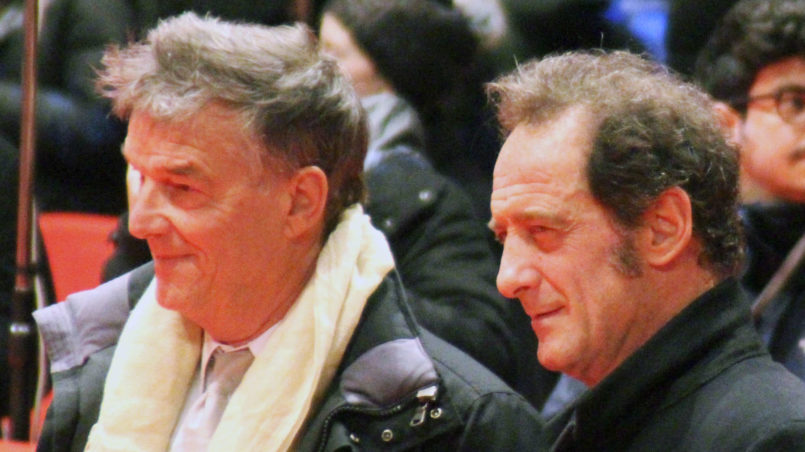The Value of People (Stéphane Brizé)

** Spoiler on **
Thierry, 51, married, the father of a handicapped son, has been unemployed for a long time. The company that he used to work for has several legal disputes pending. The former employees are trying together to get their money but with little success as they have neither the money (for lawyers) nor the time (for protests).
On the verge of insolvency – the bank refuses to loan him any more money but wants to sell him a death insurance policy to protect his loved ones – Thierry tries to sell his mobile home at a fair price. He fails because his predicament is recognised. The employment office forced him to attend a further training course after which both he and the authorities realise that there are no vacancies for the skills which he has learned..
Frustration. But there is no time to be down in the mouth.
A job interview via Skype shows that he is willing to accept any position, even those for which he is over-qualified. Finally he gets a job as a store detective in a store chain and gets to know people who, like him, at the lower end of society, are trying somehow to keep their heads above water. An older man who steals a little meat, a woman at the checkout who books the loyalty points that her customers don’t want on her own account. And another woman at the checkout who takes the discount vouchers out of the rubbish bin to use them again. She is in such a bad financial position, no longer sees a way out and takes her own life only days after being fired. At her funeral, the store manager tells her fellow workers not to blame themselves (the possible responsibility of the store management is not even mentioned): personal problems led to the tragic event, nobody could see into the woman and her thoughts. Thierry can hardly bear this way of treating people and draws his own conclusions, knowing full well that he will once again have to make a new start
** Spoiler off **
Der Wert des Menschen convincingly shows the situation in which people who just manage to maintain their position in society find themselves. Troubles, obstacles, the difficulty in trying to become re-integrated in the employment process from which they were removed through no fault of their own. How much energy it costs to make an effort every day to get out of the “hole” with the knowledge that the chances of finding a job are low and dwindling with every day that they are unemployed. Phrases such as “Anyone who wants to work will always find a job” or “If only he had learned more” or terms such as “social scrounger” are often heard in various discussions or uttered by many people. But only a few can imagine what such a life must be like.
This film – awesome and depressing at the same time – helps.
In the second half of the film Thierry asks himself as well as the audience how we can live with ourselves when, on the one hand, we watch every move that ordinary people make and penalise minor misconduct with a loss of employment and, on the other hand, we know that the owner of companies can expect and normally realise increasing profits in order to get richer. And with the knowledge that those who engage in misconduct which is much more serious than theft or offences with discount vouchers are often not called to account for their actions or can „buy“ themselves free as numerous examples from the past decades show. The wealth of one individual could not be accumulated if it weren’t for the other millions who struggle to survive every day and who have to accept any work offered to them. Thierry is one of these millions. Not because he is a sadist or a masochist but because the economy and society force him into this position.
The social hammock is not an option for him, he wants to work.
Thierry is not an isolated case. He has a family, is not limited due to illness or otherwise affected by an extraordinary fate. And exactly because of this everyone can understand and relate to his story (in contrast to the many exaggerated Hollywood productions). Thierry is not striving for wealth or special treatment: He merely wants a simple life as everyone is entitled to. To be able to live from his work.
And to be able to look at himself in the mirror every morning.
That this does not seem to be possible for a growing number of people in our western society, based on high values, is the film’s message.
Most of the film was produced with a hand camera which gives the film the character of a documentary. The basic mood is gloomy throughout, fitting to the story. Most of the „actors“ are laypersons who work or have worked in the jobs which they do in the film.
Go and see the film. It’s worth it.
Translation German-English: Donna Stockenhuber
Credits
| Image | Title | Author | License |
|---|---|---|---|
 |
Benoît_Jacquot_und_Vincent_Lindon_Berlinale_2015 | Queryzo | CC BY-SA 4.0 |
